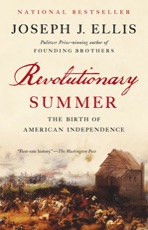
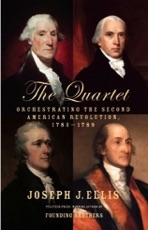
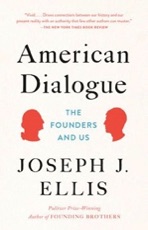
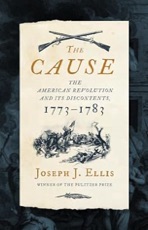






For signed copies, please contact our friends at the Yankee Bookshop.
(802-457-2411)
To purchase any of Professor Ellis's most recent books, please visit your local independent bookstore. In addition, his books can be quickly and securely ordered online through Amazon or Barnes and Noble, as well as many other sites.
Books





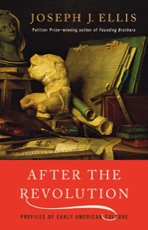
THE CAUSE - THE AMERICAN REVOLUTION AND ITS DISCONTENTS 1773-1783
George Washington claimed that anyone who attempted to provide an accurate account of the war for independence would be accused of writing fiction.
At the time, no one called it the "American Revolution": former colonists still regarded themselves as Virginians or Pennsylvanians, not Americans, while John Adams insisted that the British were the real revolutionaries, for attempting to impose radical change without their colonists' consent.
With The Cause, Ellis takes a fresh look at the events between 1773 and 1783, recovering a war more brutal than any in American history save the Civil War and discovering a strange breed of "prudent" revolutionaries, whose prudence proved wise yet tragic when it came to slavery, the original sin that still haunts our land.
"With his characteristically graceful prose, Ellis offers a short, straightforward history of a critical decade in the nation's youth . . . (from) a master storyteller known for perceptive detailing. As is always the case with Ellis, he is brilliant at short takes - events, individuals . . . True to his own skills at bringing people alive, Ellis also includes sympathetic miniprofiles of normal, unsung participants in the period's fraught events: loyalists, women, Native Americans, Joseph Plum Martin ("the Zelig of the Amerian Revolution"), and, perhaps the most captivating, Washington's personal slave, Billy Lee . . . It's hard to imagine a better-told brief history of the key years of the American Revolution." Kirkus Reviews
W.W. Norton & Company, Inc. (2021)
AMERICAN DIALOGUE: THE FOUNDERS AND US
The award-winning author of Founding Brothers and The Quartet now gives us a deeply insightful examination of the relevance of the views of George Washington, Thomas Jefferson, James Madison, and John Adams to some of the most divisive issues of American today.
The story of history is a ceaseless conversation between past and present, and in American Dialogue Joseph J. Ellis focuses the conversation on the often-asked question "What would the Founding Fathers think?" He examines four of our most seminal historical figures through the prism of particular topics, using the perspective of the present to shed light on their views and, in turn, to make clear how their now centuries-old ideas illuminate the disturbing impasse of today's political conflicts. He discusses Jefferson and the issue of racism, Adams and the specter of economic inequality, Washginton and American imperialism, Madison and the doctrine of original intent. Through these juxtapositions -- and in his hallmark dramatic and compelling narrative voice -- Ellis illuminates the obstacles and pitfalls paralyzing contemporary discussions of these fundamentally important issues.
Random House (2015)
THE QUARTET: ORCHESTRATING THE SECOND AMERICAN REVOLUTION, 1783 - 1789
From Pulitzer Prize-winning American historian Joseph J. Ellis, the unexpected story of why the thirteen colonies, having just fought off the imposition of a distant centralized governing power, would decide to subordinate themselves anew.
We all know the famous opening phrase of Lincoln's Gettysburg Address: Four score and seven years ago our fathers brought forth on this Continent a new Nation. The truth is different. In 1776, thirteen American colonies declared themselves independent states that only temporarily joined forces in order to defeat the British. Once victorious, they planned to go their separate ways. The triumph of the American Revolution was neither an ideological nor a political guarantee that the colonies would accept the creation of a federal government with power over their autonomy as states.
The Quartet is the story of this second American founding and of the men most responsible - George Washington, Alexander Hamilton, John Jay, and James Madison. These men, with the help of Robert Morris and Gouveneur Morris, shaped the contours of American history by diagnosing the systemic dysfunctions created by the Articles of Confederation, manipulating the political process to force the calling of the Constitutional Convention, conspiring to set the agenda in Philadelphia, orchestrating the debate in the state ratifying conventions, and, finally, drafting the Bill of Rights to assure state compliance with the constitutional settlement.
Ellis has given us a gripping and dramatic portrait of one of the most crucial and misconstrued periods in American history: the years between the end of the Revolution and the formation of the federal government. The Quartet unmasks a myth, and in its place presents an even more compelling truth, one that lies at the heart of understanding the creation of the United States of America.
Random House (2015)
REVOLUTIONARY SUMMER: THE BIRTH OF AMERICAN INDEPENDENCE
A distinctive portrait of the crescendo moment in American history from Pulitzer Prize-winning American historian Joseph Ellis.
The summer months of 1776 witnessed the most consequential events in the story of our country's founding. While the thirteen colonies came together and agreed to secede from the British Empire, the British were dispatching the largest armada ever to cross the Atlantic to crush the rebellion in the cradle. The Continential Congress and the Continental Army were forced to make decisions on the run, improvising as history congealed around them. In a brilliant and seamless narrative, Ellis meticulously examines the most influential figures in this propitious moment, including George Washington, John Adams, Thomas Jefferson, Benjamin Frankin, and Britain's Admiral Lord Richard and General William Howe. He weaves together the political and military experiences as two sides of a single story, and show how events on one front influenced outcomes on the other.
Revolutionary Summer tells an old story in a new way, with a freshness at once colorful and compelling.
Random House (2013)
FIRST FAMILY: ABIGAIL AND JOHN ADAMS
In this rich and engrossing account, John and Abigail Adams come to life against the backdrop of the Republic's tenuous early years.
Drawing on over 1,200 letters exchanged between the couple, Ellis tells a story both personal and panoramic. We learn about the many years Abigail and John spent apart as John's political career sent him first to Philadelphia, then to Paris and Amsterdam; their relationship with their children; and Abigail's role as John's closest and most valued advisor. Exquisitely researched and beautifully written, First Family is both a revealing portrait of a marriage and a unique study of America's early years.
"A stirring portrait of a marriage. First Family reminds us that in certain presedencies (FDR and Clinton spring to mind) there is no closer advisor than a brilliant spouse, improving the thoughts of her husband, often before he has even conceived them." The Boston Globe
Vintage Books (2011)
AMERICAN CREATION:
TRIUMPHS AND TRAGEDIES IN THE FOUNDING OF THE REPUBLIC
Acclaimed historian Joseph J. Ellis brings his unparalleled talents to this riveting account of the early years of the Republic.
The last quarter of the eighteenth century remains the most politically creative era in American history, when a dedicated group of men undertook a bold experiment in political ideals. It was a time of both triumphs and tragedies - all of which contributed to the shaping of our burgeoning nation. Ellis casts an incisive eye on the gradual pace of the American Revolution and the contributions of such luminaries as Washington, Jefferson, and Madison, and brilliantly analyzes the failures of the founders to adequately solve the problems of slavery and the treatment of Native Americans. With accessible prose and stunning eloquence, Ellis delineates in American Creation an era of flawed greatness, at a time when understanding our origins is more important than ever.
Vintage Books (2007)
HIS EXCELLENCY: GEORGE WASHINGTON
"The best one volume life of Washington, a book that should be kept in every law office and in every home." Harold Reynolds, New York Law Journal
In this landmark biography of our first president, Joseph J. Ellis brings the exacting scholarship, shrewd analysis, and lyric prose that have made him one of the premier historians of the Revolutionary era. Training his lens on a figure who sometimes seems as remote as his effigy on Mount Rushmore, Ellis assesses George Washington as a military and political leader and a man whose "statue-like solidity" concealed volcanic energies and emotions. Here is the impetuous young officer whose miraculous survival in combat half-convinced him that he could not be killed. Here is the free-spending landowner whose debts to English merchants instilled him with a prickly resentment of imperial power. We see the general who lost more battles than he won and the reluctant president who tried to float above the partisan feuding of his cabinet. His Excellency: George Washington is a magnificant work, indispensable to an understanding not only of its subject but also of the nation he brought into being.
Vintage Books (2005)
FOUNDING BROTHERS: THE REVOLUTIONARY GENERATION
In this landmark work of history, the National Book Award-winning author of American Sphinx explores how a group of greatly gifted but deeply flawed individuals - Hamilton, Burr, Jefferson, Franklin, Washington, Adams, and Madison - confronted the overwhelming challenges before them to set the course for our nation.
The United States was more a fragile hope than a reality in 1790. During the decade that followed, the Founding Fathers - re-examined here as Founding Brothers - combined the ideals of the Declaration of Independence with the content of the Constitution to create the practical workings of our government. Through an analysis of six fascinating episodes - Hamilton and Burr's deadly duel, Washington's precedent-setting Farewell Address, Adam's administration and political partnership with his wife, the debate about where to place the capital, Franklin's attempt to force Congress to confront the issue of slavery and Madison's attempts to block him, and Jefferson and Adams' famous correspondence - Founding Brothers brings to life the vital issues and personalities from the most important decade in our nation's history.
Vintage Books (2002) Winner of the Pulitzer Prize
PASSIONATE SAGE: THE CHARACTER AND LEGACY OF JOHN ADAMS
"Passionate Sage is (Ellis's) best book." Judith Shulevitz, New York Times Book Review
A fresh look at this astute, likably quirky statesman, by the author of the Pulitzer Prize-winning Founding Brothers and the National Book Award-winner American Sphinx. "The most lovable and most laughable, the warmest and possibly the wisest of the founding fathers, John Adams knew himself as few men do and preserved his knowledge in a voluminous correspondence that still resonates. Ellis has used it with great skills and perception not only to bring us the man, warts and all, but more importantly to reveal his extraordinary insights into the problems confronting the founders that resonate today in the republic they created."
Edmund S Morgan, Sterling Professor of History Emeritus, Yale University
W. W. Norton & Company (2001) National Bestseller
AMERICAN SPHINX: THE CHARACTER OF THOMAS JEFFERSON
Ellis sifts the facts shrewdly from the legends and the rumors, treading a path between villification and hero worship in order to formulate a plausible portrait of the man who still today "hover(s) over the political scene like one of those dirigibles cruising above a crowded football stadium, flashing words of inspiration to both teams."
For a man who insisted tha tlife on the public stage was not what he had in mind, Thomas Jefferson certainly spent a great deal of time in the spotlight - and not only during his active political careers. After 1809, his longed-for retirement was compromised by a steady stream of guests and tourists who made of his estate at Monticello a virtual hotel, as well as by more than one thousand letters per year, most from strangers, which he insisted on answering personally. We watch him exhibiting both great depth and great shallowness, combining massive learning with extraordinary naivete, piercing insights with self-deception on the grandest scale.
Vintage (2001) 1998 National Book Award - National Bestseller
AFTER THE REVOLUTION: PROFILES OF EARLY AMERICAN CULTURE
Joseph Ellis provides a unique perspective on the role of culture in post-Revolutionary America, both its high expectations and its frustrations through portraits of four figures.
Charles Wilson Peale: Portrait of the American Artist as Virtuous Entrepreneur . . .
Hugh Henry Brackenridge: The Novelist as Reluctant Democrate . . .
William Dunlap: The Dramatist as Benevolent Patriarch . . .
Noah Webster: The Connecticut Yankee as Nationalist . . .
Each life is fascinating in its own right, and each is used to brightly illuminate the historical content.
W.W. Norton & Company (1979) Reprinted 20002
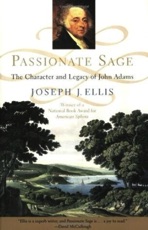
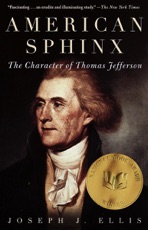
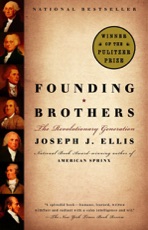
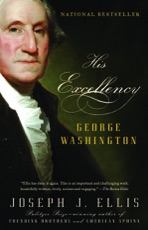
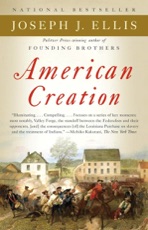
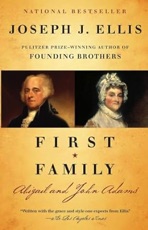
Joseph J. Ellis

COMING SOON Realities and Regrets: The Tragic Side of the Founding from Knopf

